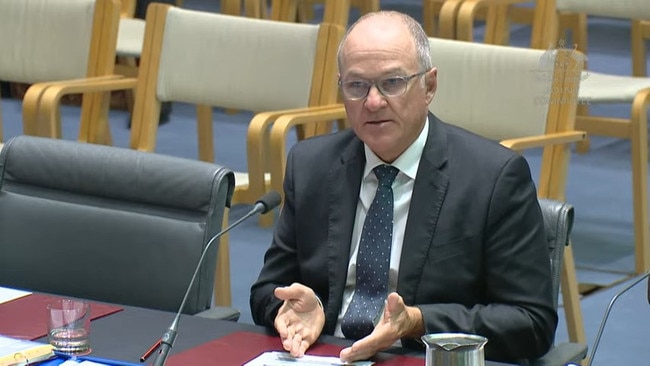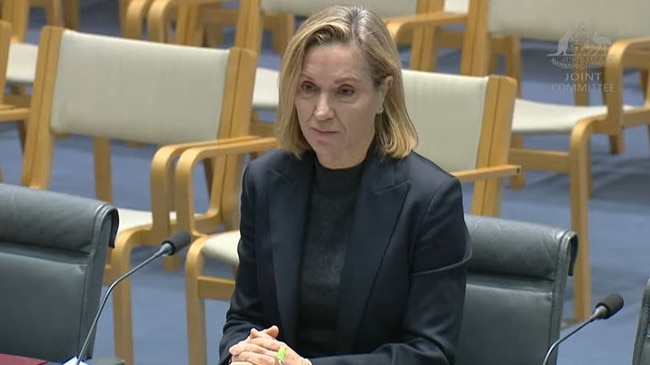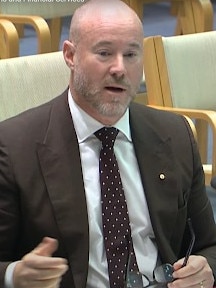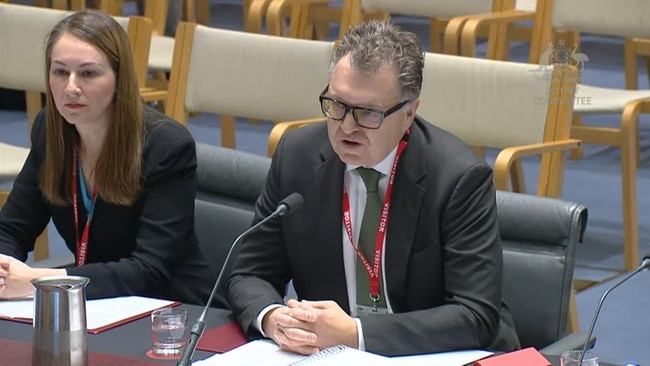PwC’s former chief lawyer points finger at ex-CEO Tom Seymour over handling of tax scandal
An extraordinary day of public hearings revealed deep discord and concerns at the heart of PwC over its handling of the tax scandal crisis.

Politicians have warned a secret pay deal for PwC Australia’s chief executive left him open to a conflict of interest over a response to a tax scandal, as an extraordinary day of public hearings revealed deep discord and concerns at the heart of the audit and consulting giant over its handling of the crisis.
The bruising day saw PwC’s former chief lawyer accuse former CEO Tom Seymour of concocting the firm’s ham-fisted response to the tax scandal, an allegation turned back on the veteran lawyer who was instead blamed for the disastrous approach.
Appearing before the Parliamentary Joint Committee on Corporations and Financial Services, PwC’s former general counsel, Meredith Beattie, said Mr Seymour’s involvement in responding to the scandal and his alleged creation of legal schemes designed to frustrate regulators so concerned her she told senior members of the firm he should not be made CEO.
Ms Beattie, who retired from PwC in July last year, alleged Mr Seymour was key to PwC’s handling of its war with the Australian Taxation Office and was an architect of the firm’s legal strategy that so frustrated the ATO.
This came after the ATO was alerted to a potential misuse of confidential government tax information by PwC’s former head of international tax, Peter Collins, who was found to have shared briefings obtained from a private consulting process with Treasury over mooted tax reforms.
Ms Beattie’s appearance came in a multi-pronged day as parliament sought to scrutinise PwC’s current and former leadership over its handling of the tax scandal and subsequent clean-up efforts.

The veteran lawyer, who acted as PwC general counsel for almost 20 years, told the committee she grew concerned over PwC’s response to the scandal, after learning that Mr Seymour reportedly was involved in handling the firm’s responses to the ATO.
Ms Beattie told the committee she was also concerned at the legal wrangling from PwC’s tax practice, led at the time by Mr Seymour, which was “problematic”.
Ms Beattie said as a result she reviewed PwC’s provision of documents to the ATO in which “it became apparent that privilege claims had been made for which there was not a proper basis”.
“There was a small group within the tax group who had not been performing in accordance or adhering to the protocols that I had put in place,” she said.
Ms Beattie said PwC’s former CEO, Luke Sayers, was also fully briefed on the matter.
But Ms Beatie said she was assured by others in the firm that the ATO’s concerns were unfounded.
However, she also noted that Mr Sayers was warned by ATO second commissioner Jeremy Hirschhorn that the tax office thought Mr Collins had breached confidentiality, including sharing detailed information with counterparties in Ireland.
A trove of emails collected by the Tax Practitioners Board, as part of its investigation into Mr Collins prior to his banning, revealing multiple international links to the scandal.
As part of its investigations into the tax scandal, PwC ran the ruler over the Irish firm.
Ms Beattie said she ultimately grew so concerned over PwC’s handling of the issue and Mr Seymour’s involvement she gave legal advice to senior members of the firm, noting he had to face “accountability for this because of the problems that occurred”.

Ms Beattie said she told PwC’s board, alongside the then-CEO Mr Sayers that Mr Seymour “should not proceed as CEO”, giving legal advice to the firm’s then-chairman, Peter Van Dongen.
“I left that meeting expecting that on the basis of the facts that were put before the board, they would form the view that Mr Seymour should not proceed,” she said.
Ms Beattie said she had never previously voted in a CEO election, but voted against Mr Seymour.
Despite this, Mr Seymour was elected.
But appearing later in the day Mr Seymour sought to refute Ms Beattie’s evidence, instead pointing the finger at the former general counsel over the firm’s handling of the tax scandal.
Mr Seymour said Ms Beattie “was the person responsible” for running the firm’s response to the tax office.
Mr Seymour said there was “tension” between him and Ms Beattie, telling the committee he had raised concerns over her responses to the ATO as “too legalistic” as PwC battled tens of thousands of legal professional privilege claims over access to documents.
This ultimately resulted in PwC settling a peace deal in which the firm paid a $642,000 fine for 170 “false” legal professional privilege claims.
Mr Seymour told the committee he became aware of the international links of the tax scandal as the matter unravelled internally, noting he was aware of six global partners caught up in the scheme.
But the former CEO said he found PwC’s response, to protect the identities of these partners and punish a suite of Australian partners, odd.

The parliament sought to hone in on the seemingly uneven handling of the scandal, with Labor senator Deb O’Neill warning the current CEO of PwC Australia, Kevin Burrowes, his $1.2m payment from the international arm of the firm, on top of his $2.8m salary, risked a perception of a conflict of interest.
Mr Burrowes only revealed the extra pay to the parliament in late June, after facing questions from the parliament and despite telling a Senate committee months earlier that he was only paid $2.8m.
In response to questions, PwC said Mr Burrowes was being handed the cash as part of a consulting deal to advise the international arm of the firm about the Australian handling of the tax scandal.
But the committee heard Mr Burrowes had kept the cash secret within the firm, with only members of the governing board aware of the top-up for almost a year, in a move described by both former CEOs Mr Seymour and Mr Sayers as very unusual.
Senator O’Neill warned Mr Burrowes his connection to the international arm of the firm made its reluctance to hand over a copy of a report into the tax scandal prepared by global law firm Linklaters “intolerable”. But Mr Burrowes said the report was “not relevant” to what “happened here in Australia”.
“I actually don’t believe it’s pertinent to what we got to do in Australia,” he said.
Liberal senator Paul Scarr has warned of a “clear conflict of interest” in PwC’s payments to Australian CEO Mr Burrowes, saying the local boss was being paid by the two arms of the firms with competing aims.
“If you consider the interests of the PwC Australia, that’s their interests, their economic interests, those can be impacted by the view that PwC international takes with respect to the success or otherwise of the remediation process,” Senator Scarr said.






To join the conversation, please log in. Don't have an account? Register
Join the conversation, you are commenting as Logout